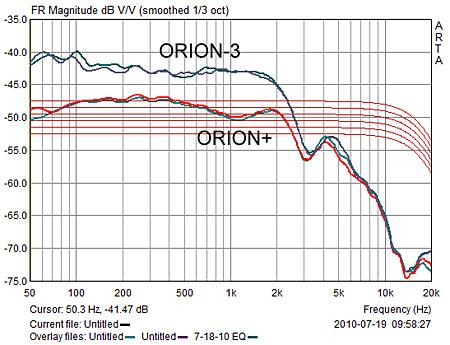Orion Research 3.1
Listed · 241 Views
Time Left: 14 Days
Ending: 06/13 at 05:10 PM ET
New Retail Price:$8,000.00
$2,200.00
| Condition | |
| Payment methods | |
Contact seller after sale to pay viaCertified check, COD or Wire Transfer | |
| Ships from | Richmond, VA, 23229 |
| Ships to | United States |
| Package dimensions | unspecified |
| Shipping carrier | Local pickup only |
| Shipping cost | N/A |
| Research Pricing |
Helping a close friend sell this entire Orion system. It has all required to be 100% complete even down to the cables. To use the Parasound amp included you would need a extra set of XLR to RCA adaptors. Simply amazing tri-amped package here. All drivers are 100% and they sound fantastic!!!
If you don't want the Parasound HCA-1206, We can easily keep that and sell to someone else. That would be worth say around $700.00
Please note that I prefer Venmo or zelle, PP friends/family as I loathe regular paypal. etc.
https://www.linkwitzlab.com/orion-rev3.htm
With Revision 3.1 the filter circuits in the ASP of the ORION+ loudspeaker system have been modified for a perceptually neutral frequency response, top to bottom. The result is increased resolution, spaciousness and dynamic range. The system now fully exploits Revision 2, which was the addition of the rear tweeter resulting in ORION+. Revision 0.1 was the mounting of the midrange driver by its magnet for vibration isolation.
Ever since PLUTO came about I felt challenged by its midrange presentation, which sounded more accurate to me than the ORION's. So I finally started a project to investigate my ORION equalization of 8 years ago. I had designed the speaker for a flat on-axis free-field response as measured outdoors. A flat frequency response tends to sound too bright indoors and my design procedure has been to correct this by listening to program material and then adjusting the tweeter level down until it sounded in balance with the midrange. This then became the nominal tweeter level and the center position for an adjustment potentiometer with a +/-.2.5 dB range.
For Revision 3 I re-measured the baffle mounted midrange driver without 120 Hz and 1.4 kHz crossover filters, but with 400 Hz and 5 kHz notch filters and dipole equalization applied. I noted the non-flat response above 500 Hz. Correction required a good amount of computer simulation and measurement to arrive at a realizable and satisfactory response curve. The graphs below show the measured acoustic free-field response, on-axis for the midrange driver on the left and the associated driver terminal voltage on the right. The 120 Hz and 1.4 kHz LR4 crossover filters were not engaged.
 |
No questions have been asked about this item.
Ask the seller a public question
You must log in to ask a question.
Return Policy
Return Window
Item can be returned within 14 days of receipt.
General Terms
Items must be returned in their original condition, with all included packing materials and no signs of use. Buyer assumes responsibility for all shipping return costs unless the item was not received as described.
Refunds
Buyer will receive a full refund in the original payment method less any shipping charges.
Special Conditions
Must be returned in original box and packing and in as-shipped condition. Returns at full refund will be 100% if item is found to be defective. "It just doesn't sound good in my system" will NOT cut it!
Listings Similar to Orion Research
3 Watchers


